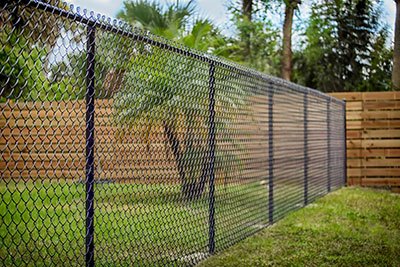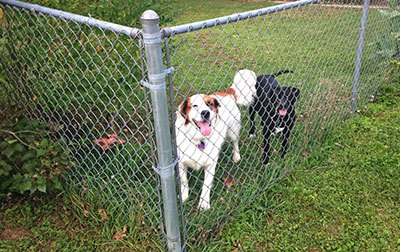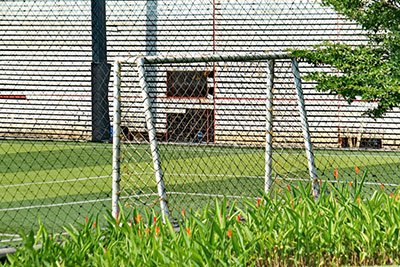Are you a farmer looking to keep animals in and out of your farm? A wire fence is an effective way to do so, but it can be hard to know which gauge size would work best for different critters.
In this comprehensive guide, we’ll:
– break down the meaning behind the numbers on a wire fence gauge,
– explain why each size matters
– help you decide which one suits your needs best.
Read on to make sure that the right kind of fencing will safeguard your land’s bounty!
Take away key points:
- Different measurements in gauges originate from the rolling mill techniques
- The gauges vary in size as they offer different purposes and applications
- You must know the exact need of your fencing system to ensure the best solution for your property
- Always ask fencing experts to help you when in dilemma, as they will provide reliable information for your fencing standards
Table of Contents
The best wire gauge for chain link fence explained
If you need to know more about the gauges, how to choose the best type, and their main purpose, read our guide below. You will find all the crucial information in one place.
The chain link fence gauge explained: The main purpose

Wire gauge size is a measurement of a wire’s diameter, represented by a numerical value. A smaller wire gauge refers to a larger diameter, while a larger wire gauge refers to a smaller diameter. The gauge number is important in determining the amount of electric current a wire can safely carry, as well as its electrical resistance.
Wire gauges play a critical role in electrical systems, as it helps to ensure proper functionality and safety. Wire gauges are commonly used in automotive, marine, and electrical industries, where different applications require different wire sizes.
As a rule of thumb, a larger wire gauge size is best suited for low-voltage applications, while smaller wire gauge sizes are preferred for high-voltage applications, since thicker wires may cause more resistance or overheating.
Having a basic understanding of fence gauge wire sizes can help you choose the precise size for your specific application, ensuring safety and proper functionality. It will also make a big difference in terms of the durability and reliability of your chain link wire diameter.
What’s the right wire gauge for chain link fences?

The most common gauges commonly used in chain link fences are the:
– 6 gauge wire: 0.192 inches,
– 9 gauge wire: 0.148 inches,
– 11 gauge wire: 0.120 inches
– 11.5 gauge wire: 0.113 inches thick.
Residential and commercial applications of chain link fences typically use a 9 gauge wire of the chain link that features a 2-inch diamond pattern. Thinner wire like 11 or 11-11.5 gauge may be utilized for temporary fencing and construction sites.
For high-security chain link fences, the ticker wire – a 6 gauge wire is preferred. This is a higher wire thickness and stronger wire type. The diamond sizes for the chain link fence project vary depending on the specific application and manufacturing process.
In addition, a 7-gauge wire (seven dies) is thicker than a 12-gauge wire. A skilled commercial fence installation company will utilize state-of-the-art technology tools to ensure precision when measuring the size of the thinner or thicker wire and mesh size.
For your livestock and lightweight animals, a 12-gauge chain link fence with a diamond pattern might be the best solution. If you deal with large animals and heavy animals – horses, cows, bulls, then the gauge thickness of 9 is the right gauge and is recommended.
For your orchard, the experts recommend the chain link fence’s strength of 14 gauge.
For your pets and smaller animals, such as dogs or goats, the right gauge of chain link fence is 16 gauge. However, for all larger animals that might jump easily over the chain link wire, you need to ensure the chain link fence exceeds the waist height.
As there are multiple models available, with different purposes and applications, you should know the precise needs and conditions of your property in advance. Thus, you can choose the best solution easily.
What’s the strongest gauge number for chain link fences?
For the chain link fence, the most robust wire gauge is the 6 gauge, which measures 0.192 inches in thickness. This gauge size is typically found around high-security facilities and is not commonly used for residential properties. When purchasing a new fence for your home, you’ll likely opt for the 9 gauge chain link fence instead.
What are the extra benefits of chain link fences?
One of the main reasons why business owners opt to hire chain-link fence installation companies for their commercial properties is due to safety and security concerns. Chain-link fences are known for their dependability, strength, and affordability, making them an ideal choice for many.
While many commercial property owners may prefer a more visually-appealing barrier, chain-link fence models offer added protection and deter intruders from hiding. They are also cost-effective and reliable, making them a practical choice for large commercial spaces.
Unlike other visible walls and fences made of materials such as steel wire, vinyl, aluminum, and wood, chain-link fence types are uniquely constructed to provide enhanced stability and clarity. chain link fabric also allows sunlight to flow through easily.
Making your chain link fence stronger

Here are some options to ensure the chain link fabric remains stronger over time:
– To prevent damage to the chain link fence, particularly from neighborhood animals, consider attaching stakes, rails, or guards to the bottom. These additional supports can provide stability and act as a barrier between the fence and the ground.
– Incorporating chain link fence slats into the fabric can not only offer more privacy but can make the fence look less like a standard chain link fence, stabilize it, and make it tougher for intruders to climb during a break-in.
– Be mindful of plants growing nearby, such as trees or bushes, as they can quickly become intertwined with the fence fabric and cause damage. Adding extra posts to areas where the fence is leaning may also be necessary for additional support.
– Although replacing the chain link fence may be costly, it may become necessary if it is beyond repair. A custom-designed chain link fence can be created to fit within your budget while ensuring the security of your property.
FAQs
Which is a thicker 11 gauge or 9 gauge fence?
The thicker wire is a 9-gauge model. But, you need to consult the fencing company for your specific needs. The 9-gauge fence offers more security than the 11-gauge fence.
What is a thicker 14 gauge or 16 gauge fence wire?
The 14-gauge fence is thicker and stronger than the 16-gauge fence wire.
Which is thicker 9 gauge or 12 gauge wire?
The 9 gauge is thicker and stronger than the 12 gauge wire.
What fence wire gauge is right for me?
The right wire depends on your needs. For instance, if you have smaller animals, you can use 16 gauge. For temporary fencing, you can use 11-11.5 gauge. But, for more security and residential or commercial applications, you can use 9 gauge wires are the most common gauges.
Conclusion
It is essential to use a wire gauge that best suits your needs, as this can mean the difference between an effective and inadequate fencing system. Gathering necessary information about the resistance of the particular wire you need is critical.
Always remember to consult a professional when in doubt regarding wire gauges. After all, finding the right fence means more than just security; it also adds value to your property!
